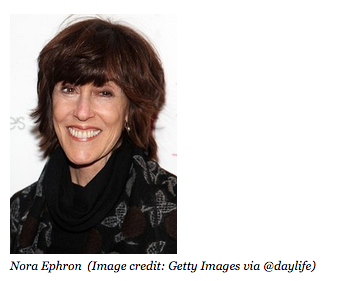
What Marketers Can Learn From Nora Ephron
Every time I find a sticky packet of sugar at the bottom of my purse, I think of Nora Ephron.
I once saw the divine Ms. Ephron dump out the contents of her purse (on purpose) at a conference in New York City, and the mish mash of random objects that fell out caused the audience to howl with knowing laughter. How did she do it? How did she know that everyone’s purse was just as messy, and how could she be so brave in exposing herself – and by implication all of us – in this way? It was a classic Nora Ephron moment. Her message to women that day, and on most days, seemed to be: I know you better than you know yourself. I know you look like a million bucks to passers by, but inside that nice purse of yours is a mess of empty gum wrappers, loose change, a fuzzy aspirin, three-year-old receipts and hair balls. Cue the belly laughs. As an audience of women we could try to deny it, but we were laughing too hard. It was all true and she knew it, and we loved her for knowing it.
In my business of marketing and selling to women (www.thefemalefactor.com), we help companies understand the economic power of women consumers, and the context of female culture, which is the study of how women view the world and everything in it. And when people ask me what books they should read on the subject, I give recommendations that include everything from academic texts on gender to classics like Deborah Tannen’s You Just Don’t Understand, alongside my own book, Why She Buys. But then I throw them a ringer, and tell them to pick up I Feel Bad About My Neck by Nora Ephron. The book is ostensibly about aging, but in reality it’s an unvarnished, comical blow-by-blow of western female culture on topics ranging from beauty to motherhood to divorce. You could get whiplash from nodding vigorously at the end of every sentence, particularly if you are female. It provides a colorful window into women’s culture that can be enlightening for anyone whose business depends on marketing effectively to women, which these days, means just about any consumer business.
Read More on Forbes.

Source: BB Wix
